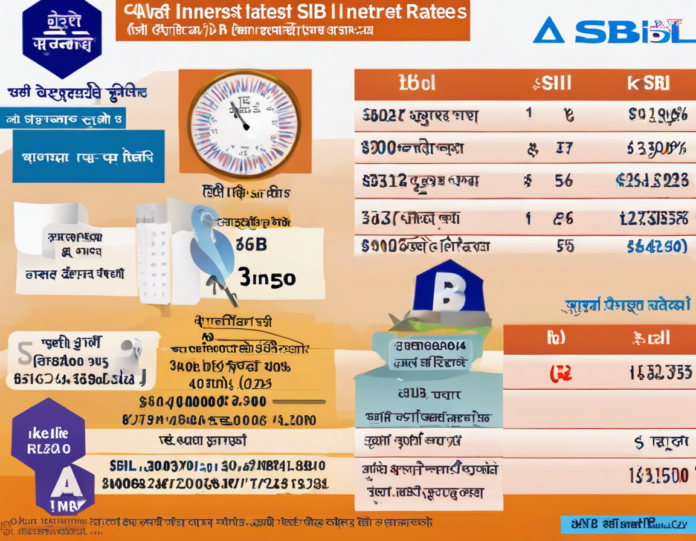Are you considering opening a Recurring Deposit (RD) account with State Bank of India (SBI)? It is essential to understand the SBI RD interest rates for 2023 to make an informed decision about your investment. An RD account allows you to deposit a fixed amount regularly for a pre-determined period, offering you a lump sum at maturity along with the interest earned. In this detailed guide, we will take a closer look at SBI RD interest rates, how they are calculated, the benefits of investing in an RD account with SBI, and everything else you need to know to maximize your returns.
Understanding SBI Recurring Deposit (RD)
A Recurring Deposit (RD) is a type of term deposit offered by banks and financial institutions that allows individuals to deposit a fixed amount every month for a predetermined period, typically ranging from 6 months to 10 years. The interest earned on an RD is similar to that on a Fixed Deposit (FD) but is calculated differently. With an RD, you can start with a minimum monthly deposit amount and in multiples thereof. SBI, being one of the largest public sector banks in India, offers attractive RD schemes to help individuals grow their savings efficiently.
SBI RD Interest Rates 2023
Current SBI RD Interest Rates
As of 2023, SBI RD interest rates are subject to change periodically based on market conditions and the Reserve Bank of India’s (RBI) monetary policy. The interest rates offered by SBI on RD accounts may vary based on the deposit amount, tenure, and customer category (regular customers/senior citizens).
SBI RD Interest Rates for Regular Customers
- For tenures of up to 1 year, the interest rate for regular customers ranges between 5.50% to 5.75%.
- For tenures above 1 year to 10 years, the interest rate for regular customers ranges between 5.80% to 6.00%.
SBI RD Interest Rates for Senior Citizens
Senior citizens are offered slightly higher interest rates compared to regular customers to cater to their specific needs:
- For tenures of up to 1 year, the interest rate for senior citizens ranges between 6.00% to 6.25%.
- For tenures above 1 year to 10 years, the interest rate for senior citizens ranges between 6.30% to 6.50%.
It is essential to check the latest SBI RD interest rates before opening an RD account to ensure you maximize your returns.
How is Interest Calculated on SBI RD?
The interest on your SBI RD account is compounded on a quarterly basis. The formula to calculate the interest on an RD is as follows:
[Interest = P \left(1 + \left(\frac{R}{100 \times 4}\right)\right)^{N \times 4} – P]
Where:
– P = Monthly RD installment
– R = Rate of interest per annum
– N = Tenure in years
By using this formula, you can determine the interest earned on your SBI RD account accurately.
Benefits of Investing in SBI RD
Steady Returns
One of the primary advantages of investing in an SBI RD is the assurance of steady returns. The interest rates offered by SBI on RD accounts are competitive, providing you with a reliable source of income.
Flexible Deposit Options
SBI offers flexible deposit options for RD accounts, allowing you to choose the monthly installment amount based on your financial goals and capacity.
Loan Against RD
In times of financial need, you can avail of a loan against your SBI RD account. This feature provides you with instant liquidity without breaking your RD prematurely.
Tax Benefits
Interest earned on SBI RD accounts is taxable as per the prevailing income tax laws. However, by investing in an RD, you can avail tax benefits under Section 80C of the Income Tax Act, 1961.
How to Open an SBI RD Account
Opening an SBI RD account is a simple and hassle-free process. Here’s a step-by-step guide to help you get started:
- Visit the nearest SBI branch or the official SBI website.
- Fill out the RD account opening form with the required details.
- Submit the necessary documents such as identity proof, address proof, and photograph.
- Choose the monthly installment amount, tenure, and nomination details.
- Deposit the initial amount to activate your RD account.
Once your RD account is active, you can start depositing your monthly installments and watch your savings grow over time.
Frequently Asked Questions (FAQs)
1. Can I withdraw my RD prematurely?
Yes, you can withdraw your RD prematurely; however, a penalty fee will be charged by the bank.
2. What is the minimum deposit amount for an SBI RD?
The minimum deposit amount for an SBI RD account is Rs. 100 per month and in multiples thereof.
3. Is the interest earned on an RD taxable?
Yes, the interest earned on an RD is taxable as per the prevailing income tax laws.
4. Can I avail a loan against my SBI RD account?
Yes, you can avail a loan against your SBI RD account to meet your financial requirements.
5. Are senior citizens offered higher interest rates on SBI RD accounts?
Yes, senior citizens are offered slightly higher interest rates on SBI RD accounts to cater to their specific needs.
6. Are the SBI RD interest rates fixed or variable?
SBI RD interest rates are subject to change periodically based on market conditions and RBI’s monetary policy.
7. How is interest calculated on an SBI RD account?
The interest on an SBI RD account is compounded on a quarterly basis using a specific formula based on the monthly installment amount, tenure, and interest rate.
8. Can I open an SBI RD account online?
Yes, you can open an SBI RD account online through the official SBI website or internet banking portal.
9. What are the tenure options available for an SBI RD account?
SBI offers tenure options ranging from 6 months to 10 years for RD accounts to suit varying investment goals.
10. Is there a nomination facility available for SBI RD accounts?
Yes, you can nominate a family member or beneficiary for your SBI RD account to ensure a smooth transfer of funds in case of any unforeseen circumstances.
In conclusion, investing in an SBI RD account can be a smart way to grow your savings steadily over time while earning competitive interest rates. By understanding the SBI RD interest rates for 2023 and the associated benefits, you can make well-informed investment decisions and plan your finances effectively. Remember to assess your financial goals and risk appetite before opting for any investment scheme to achieve optimal returns in the long run.

